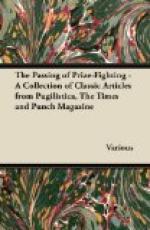Oh, but it was a bowld billy! He went in among those hounds like a lad to a fair, you could hear his horns lambastin’ their ribs a mile away. But they were too many for him and bit the grand silky hair off him by the mouthful. The way it flew you’d think it was a snowstorm.
“They have him desthroyed,” says Mikeen.
“They have,” says I, “God be praised!”
At the moment the huntsman leps his harse up on the double beside us; he was phlastered with muck from his hair to his boots.
“What have they out there?” says he, blinkin’ through the mud and not knowin’ rightly what his hounds were coursin’ out before him, whether it would be a stag or a Bengal tiger.
“‘Tis her ladyship’s Rile Imperial Mascot Goat,” says I; “an’ God save your honour for she’ll have your blood in a bottle for this day’s worrk.”
The huntsman lets a curse out of his stummick and rides afther them, flat on his saddle, both spurs tearin’. In the wink of an eye he is down among the dogs, larruppin’ them with his whip and drawin’ down curses on them that would wither ye to hear him—he had great eddication, that orficer.
“Come now,” says I to Mikeen, the poor lad, “let you and me bear the cowld corpse of the diseased back to Herself; mebbe she’ll have a shillin’ handy in her hand, the way she’d reward us for saving the body from the dogs,” says I.
But was me bowld mascot dead? He was not. He was alive and well, the thickness of his wool had saved him. For all that he had not a hair of it left to him, and when he stood up before you you wouldn’t know him; he was that ordinary without his fleece, he was no more than a common poor man’s goat, he was no more to look at than a skinned rabbit, and that’s the truth.
He walked home with meself and Mikeen as meek as a young gerrl.
Herself came runnin’ out, all fluttery, to look at him.
“Ah, but that’s not my mascot,” says she.
“It is, Marm,” says I; and I swore to it by the whole Calendar—Mikeen too.
“Bah! how disgustin’. Take it to the cow-house,” says she, and stepped indoors without another word.
We led the billy away, him hangin’ his head for shame at his nakedness.
“Ye’ll do no more mascottin’ avic,” says I to him. “Sorra luck you would bring to a blind beggar-man the way you are now—you’ll never step along again with the drums and tambourines.”
And that was the true word, for though Herself had Mikeen rubbing him daily with bear’s-grease and hair-lotion he never grew the same grand fleece again, and he’d stand about in the back-field, brooding for hours together, the divilment clane gone out of his system; and if, mebbe, you’d draw the stroke of an ash-plant across his ribs to hearten him, he’d only just look at you sad-like and pass no remarks.
* * * * *
TOP-O’-THE-MORNING.




